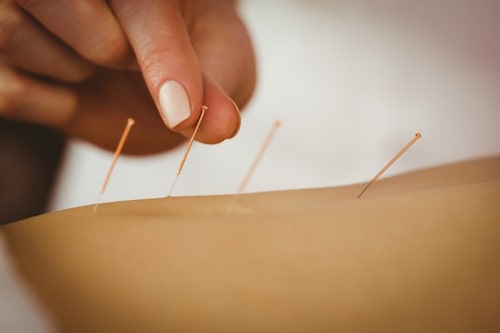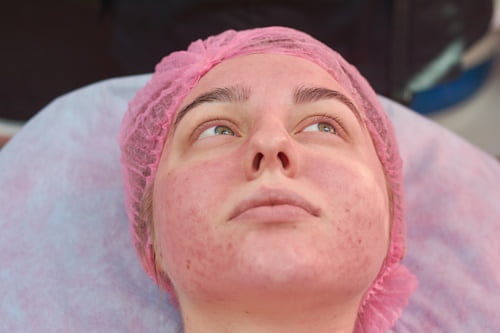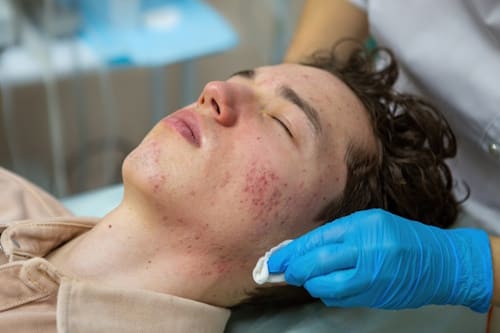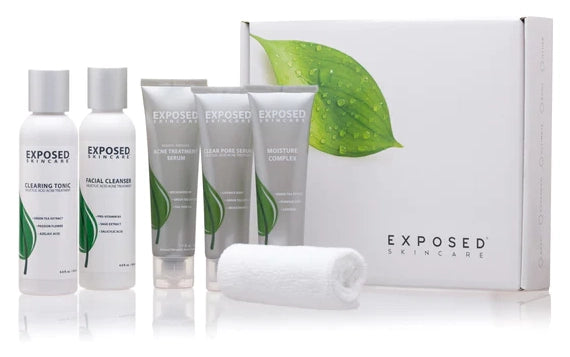For many, the journey to clear skin feels like a never-ending struggle. This struggle causes them to seek alternative treatments like Traditional Chinese Medicine (TCM).
While some attest to the benefits of using Chinese medicine for acne, it's important to evaluate this option critically. This post will discuss five reasons why relying solely on Chinese medicine for treating acne may not be the best idea.
Also read: How to choose the best acne treatment
Biggest Take-Aways:
- Traditional Chinese Medicine (TCM) treats acne through a different lens, focusing on balancing the body's energies and eliminating "heat and toxins," but lacks scientific validation.
- Though considered herbal acne solutions, the types of herbs used in TCM do not offer quick and guaranteed results for all types of acne.
- Despite its long history, TCM may not adequately address some of the root causes of acne identified by current research, such as hormonal imbalances and clogged pores.
- Exposed Skin Care offers a scientifically backed, comprehensive approach to treating acne, focusing on eliminating the root causes and offering short-term and long-term remedies.

The Science is Still Inconclusive
Chinese medicine is a treasure trove of herbal remedies, acupuncture treatments, and unique perspectives on health and wellness. However, when it comes to treating acne, the scientific evidence supporting the efficacy of Chinese medicine is still inconclusive.
Lack of Rigorous Clinical Trials
Traditional Chinese Medicine is rooted in ancient practices, often making evaluating using modern scientific methods challenging. While some smaller studies have suggested that certain Chinese herbs and acupuncture can reduce acne symptoms, large-scale, rigorous clinical trials do not substantiate these. This absence of robust scientific evidence puts into question the effectiveness of Chinese medicine for acne.
No Standardized Treatment Plans
Unlike Western medicine, which offers a standardized treatment plan for acne that ranges from topical treatment to antibiotics, Chinese medicine offers no such uniformity.
In TCM, acne is considered an imbalance of "Qi," "dampness," and "heat," and the treatment varies from practitioner to practitioner. The lack of a standard treatment plan makes it difficult to assess the actual efficacy of Chinese medicine in treating acne.
May Cause Adverse Side Effects
If you are already struggling with acne breakouts and inflamed acne, the last thing you want to deal with is adverse side effects. Unfortunately, Chinese acne medicine is not without its drawbacks.
Potential Allergic Reactions
Many herbs in TCM, such as Chinese angelica root, can cause allergic reactions, leading to more inflammation and acne flare-ups. This makes it a risky choice for those who have sensitive skin or are prone to allergic reactions.

Harmful to the Liver
Some Chinese herbal medicines are processed with toxic substances. Long-term use can potentially harm the liver, leading to other health complications.
Inconsistent Quality of Herbal Medicines
Traditional Chinese Medicine relies heavily on herbal solutions, but the quality of these herbs can vary greatly, affecting their efficacy in treating acne.
Lack of Regulation
Herbal medicines are not subjected to the same stringent regulations as Western pharmaceuticals, making ensuring their safety and quality difficult. While some herbs may work for acne, the inconsistent quality could compromise their efficacy.
Purity and Contamination Issues
Contamination is another major concern with herbal medicines. In some cases, these herbs could be adulterated with other substances, leading to potential toxicity or reduced efficacy in treating acne.
Not Suitable for All Types of Acne
Acne manifests in various forms, including blackheads, whiteheads, and more severe forms like cystic acne and hormonal acne. TCM is often not equipped to deal with all these types of acne effectively.
Ineffectiveness for Severe Acne Cases
Chinese medicine may not offer a sufficient solution for severe cases of acne like cystic acne, which often requires more intensive treatment. While some herbs may claim to "clear heat" and "remove dampness," they are often not potent enough to tackle the root cause of severe acne.

Inconsistent Results for Hormonal Acne
Hormonal acne, usually resulting from an imbalance of hormones, is another form that may not respond well to Chinese medicine for acne. Although some TCM practitioners might suggest herbal formulas to balance the hormones, these treatments often produce inconsistent results.
TCM Views Are Not Universally Accepted
The philosophy and methodology behind Traditional Chinese Medicine differ greatly from Western views on medicine and health. While TCM views acne holistically, often attributing it to factors like "Qi stagnation" or "blood stasis," these concepts are not universally accepted.
Discrepancy in Diagnostic Methods
In TCM, the diagnosis often involves methods like tongue and pulse diagnosis, which are not scientifically verified to be effective in determining the cause of acne. This discrepancy in diagnostic methods raises questions about the accuracy of the treatment plan prescribed by a Chinese medicine practitioner.
Conceptual Differences in Understanding Acne
According to TCM, acne occurs due to imbalances in the body’s "Qi" and "heat." However, these concepts don't translate neatly into the Western understanding of acne, which focuses on clogged pores, dead skin cells, and excess sebum production.
The Proven Benefits of Using Exposed Skin Care for Managing Acne
While Traditional Chinese Medicine offers a different perspective on treating acne, your focus should be on straightforward and scientifically backed acne treatments. If you've been struggling with acne, hormonal imbalances, or frequent breakouts, Exposed Skin Care may be the right choice.
Here are some compelling benefits of Exposed Skin Care:
- Proven Efficacy: Exposed Skin Care products have a proven track record, with over 20 years of experience and more than 400,000 satisfied customers.
- Targets the Root Cause of Acne: Exposed Skin Care addresses the root cause of acne, whether hormonal acne, adult acne, or clogged pores, by using a perfect blend of advanced scientific ingredients and natural extracts.
- Comprehensive Treatment: From topical treatment to clear skin serums, Exposed Skin Care offers a range of products to treat different types of acne lesions, something you won't often find in a TCM regimen.
- Quick Results: You don’t need a lengthy acupuncture session or an assortment of Chinese medicine herbs to see results. Many acne sufferers have reported seeing a significant reduction in acne bumps and scars within weeks of using Exposed Skin Care products.
- Safe and Gentle: Unlike some treatments in Traditional Chinese Medicine, which may lead to liver issues or allergic reactions, Exposed Skin Care focuses on skin health, aiming to eliminate acne without causing harm to the body.
So, while TCM may offer an alternative way of understanding acne in Chinese medicine terms if you're looking for a treatment that has stood the test of scientific scrutiny, Exposed Skin Care may be the optimal choice.
Conclusion
In acne treatment, we've seen numerous approaches to consider, ranging from Traditional Chinese Medicine to more scientifically validated methods. While TCM attempts to clear the "heat and toxins" associated with acne, its efficacy has yet to pass the scrutiny of modern science.
Although hailed as herbal acne solutions, the types of herbs used in Chinese medicine don't offer the quick and surefire relief most acne sufferers seek. According to Chinese Medicine, acne is an inflammatory skin condition that results from imbalances in the body's Qi and dampness.
However, tackling acne in TCM might not address some of the leading causes of acne, as identified by current research. Factors like hormonal imbalances, which lead to acne, or the skin’s natural oils clogging the pores, may not be adequately treated in this traditional medicine approach.
On the other hand, Exposed Skin Care has paved a different path. Its products are designed to treat acne in its various forms and offer targeted spot treatments and long-term remedies. The brand focuses on not only treating but also on the healing of acne scars and the prevention of future breakouts.
So, as you read on to learn more about the world of acne treatments, it might be wiser to consider scientifically backed options that are proven to work. With a targeted, effective approach, Exposed Skin Care has proven to be a reliable option for those looking for a more definitive path to clear skin.
FAQs
What is the Chinese medicine approach to treating acne?
Traditional Chinese Medicine (TCM) treats acne by balancing the body's Qi and eliminating "heat and toxins" through herbal remedies and acupuncture.
How does TCM view acne as a skin condition?
According to TCM, acne is an inflammatory skin condition resulting from an imbalance in the body's Qi and dampness.
Is acupuncture effective in treating acne?
There is limited scientific evidence to support the effectiveness of acupuncture in treating acne, though some believe it can help balance the body's energies.
Can Chinese herbs help with acne scars?
While some claim that certain Chinese herbs can help heal acne scars, these claims are not generally supported by scientific evidence.
How does Exposed Skin Care differ from TCM treatments for acne?
Exposed Skin Care offers scientifically-backed treatments that target the root causes of acne. It provides spot treatments and long-term remedies designed to heal acne scars and prevent future breakouts.



















